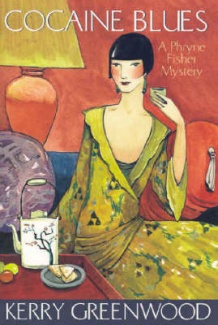Out of the Black Land, by Kerry Greenwood, 2010.
Publisher: Clan Destine Press; 459 pages
RRP AU$27.00.
Finally available again on Fishpond, with free shipping Australia-wide. Now also available in a Kindle edition.
Out of the Black Land is a bit of a departure for Kerry Greenwood, but an intriguing and enjoyable one. This is an historical novel which turns on its head much of the conventional wisdom about this period in Ancient Egypt, but with convincing research and an absorbing story.
This book is a fascinating political intrigue, a sexy love story (or two), and a new interpretation of the Akhenaton period of Ancient Egypt, all in one.
It is the story of Akhenaton’s rise and fall, told through the eyes of Queen Nefertiti’s sister, Modnodjme, and the Great Royal Scribe, previously a peasant boy, Ptah-hotep. It is also the story of how Ptah-hotep strives to keep his lover Khepperen, also a scribe and later a soldier, throughout his tenure as Great Royal Scribe, and how a single man can have two great loves simultaneously.
How can Ptah-hotep keep his lover safe, now they he has been elevated to the much desired (and therefore life-threatening) position of Great Royal Scribe? How can Nefertiti bear children to an apparently impotent King? How can Egypt survive the loss of its Gods and thus almost its whole system of government?
Out of the Black Land is narrated by the two main characters, Modnodjme, a strong, intelligent woman of independent thought, and Ptah-hotep, a clever political mover who, against all odds, survives his sudden rise to become a wise and ethical force in the palace.
Kerry Greenwood has said that if she had been better at maths, she would have been an archaeologist, and Egyptology and particularly the Pharaoh Akhenaton had long held an interest for her. Out of the Black Land grew out of two key facts she observed in reading about Akhenaton and then visiting Egypt herself. First, the Pharaoh got a lot of positive press from Christian scholars for being a monotheist, in a tradition of polytheism, and second, there seemed to be no prohibition in ancient Egypt against same-sex love or sex. Indeed, one important tomb she visited had a depiction of two men making love in the reeds.
I’m not going to try to fit this novel into a wider array of Egyptian historical novels or ancient history. They are not my areas of expertise, and besides, Kerry Greenwood makes no bones about the fact that she takes the theories available in Egyptology as they suit her purposes, though she also spent a lot of time consulting the primary sources and coming to her own conclusions.
No doubt there will be those scholars (amateur and professional) horrified by Greenwood’s complete reversal of conventional wisdom about the reigns of Akhenaton and his successors, but she has a compelling argument that overturning the priesthood of Amen-Re, and thus effectively the country’s civil service, would have been completely disastrous.
The afterword is invaluable, in my opinion, in explaining Greenwood’s thinking and fitting the novel into the wider history. I was also very grateful for the ‘what happened to…’ section, as somehow, despite the fact that these are clearly largely fictional characters, albeit loosely based on historical figures of whom we have some little knowledge, you do come to care, and wonder what their ‘real’ fate was. Or I did anyway. I would have liked a pronunciation guide. Apparently no one knows how to pronounce Ancient Egyptian, but some general conventions would still have been appreciated.
From an historical perspective Out of the Black Land makes interesting reading. From a purely literary perspective, the plot is tightly woven, the political intrigue gripping, and the love stories compelling. A thoroughly enjoyable read.
This review is part of my commitment to the Australian Women Writer’s Challenge.

